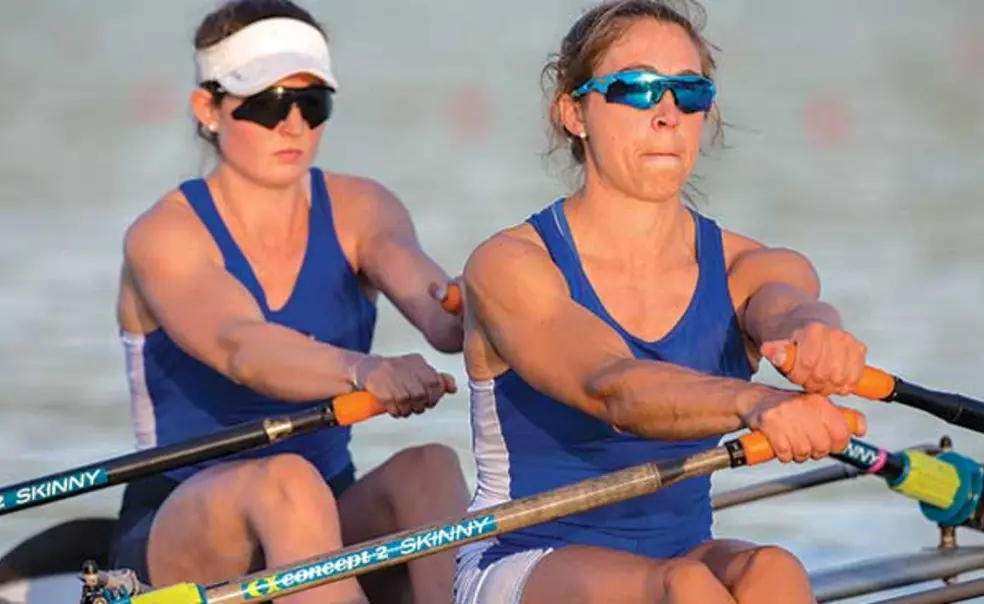Training for Tokyo: Chasing Speed
Stone ’07, a silver medalist at the Rio games, keeps rowing with an eye toward 2020
This is the first in a series of articles about Princeton’s 2020 Olympic hopefuls.
It’s the kind of thought that doesn’t leave you. Late at night, after the lights have been turned off and the phone is silenced, it surfaces again: How fast can I go?
For Gevvie Stone ’07, who rowed at Princeton for four years, including when the Tigers won the 2006 NCAA Championships, that thought has been there for more than a decade. It stayed with her through the 2012 Olympics in London, where she placed seventh in the women’s single sculling event. It persisted as she trained on the Charles River, when she used the physical demands of rowing to balance the mental demands of medical school at Tufts. After winning the silver medal in the women’s single sculling event at the 2016 Olympics in Rio de Janeiro, she thought it would subside. She had a medical residency to complete and a career as a doctor to begin.
“I knew on the plane ride home [from Rio] that the more I rowed, the more I loved it,” Stone said. “I knew I needed rowing in my life.” She shared the details of the internal argument that happens when you’re an athlete who’s fast and getting faster: “As rowers, we chase speed. I get faster, but once I do, there’s always a new faster. There’s no end in sight to chasing speed. There’s no limit to it. That idea — that challenge — is what motivates me.”
With the blessing of Beth Israel Deaconess Medical Center in Boston, where she was a resident, Stone put her career on hold to train full time. Once again, she would be vying for a spot on the national team. Once again, that question would be at the front of her mind: How fast can I go?
In April, after she had spent the winter months training with the Canadian, Austrian, and Dutch national teams, Stone’s bid to represent the United States as the women’s single sculler at the 2019 World Championships was cut short in an instant: She came in second at the selection trials in Sarasota, Fla. “I gave it my all. It wasn’t enough to win today,” Stone shared via social media while congratulating the race winner, Kara Kohler.
In a bout of serendipity, Stone’s training partner Cicely Madden, a young rower from Stone’s home club, had placed third and was up for a challenge. On the drive up the East Coast, the question that hung in the air for Stone was what to do after a loss that threatened to derail her path. “I knew it was there as soon as I reflected on it,” Stone said. “We both knew.”
What Stone knew was that she and her recent competitor should join forces and compete in the next selection regatta, held near Princeton, on Mercer Lake, in late May. This time, she and Madden would be racing against the fastest two-person sculling boats in the country. They would be vying for the chance to represent the United States in the women’s double.
“I was handed a challenge. I knew I loved racing and that I was still fit. It was adapt or die.”
— Gevvie Stone ’07
Although they had been training partners before — each in their own boat — Stone and Madden never rowed together. Four weeks isn’t much time to become the fastest women’s double in the country, but Stone knew they had something good. “We knew we were getting better and better. We were training against some great training partners, including Caryn Davies and Brian Wettach [’13].”
Stone and Madden raced — and won — on the same day the Princeton women’s rowing team won the Ivy League championship on the Cooper River near Camden, N.J.
“Being back in Princeton and seeing Lori [Dauphiny, the longtime women’s open coach] and the rowing team helped contribute to the speed of the weekend,” Stone said.
Asked about the Olympics and her thoughts on competing in 2020, Stone said, “If I’ve learned anything from the past few months, it is to take it all one day at a time. I was handed a challenge. I knew I loved racing and that I was still fit. It was adapt or die.” She pauses for a moment. “A fire was lit.”
Next up for Stone? After representing the United States in a World Cup event in June, she and Madden will train for the World Championship races in Austria, which begin Aug. 25. In rowing, it’s not always what you do when you win that determines how fast you are. It’s what you do when you don’t win that sets the bar. The next year of training and racing will determine if the fire that was ignited for Stone will, once again, lead to the Olympic flame.












No responses yet